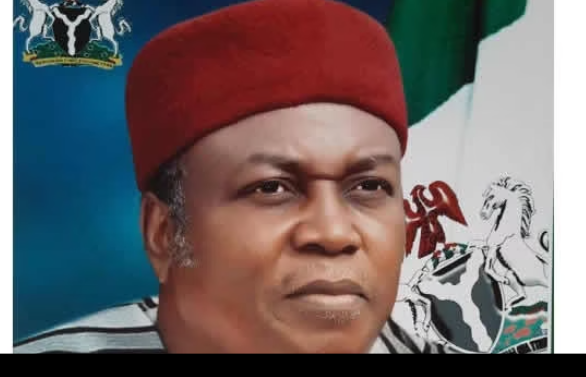The Economic and Financial Crimes Commission (EFCC) has arrested and detained former Taraba State Governor, Darius Dickson Ishaku, on allegations of involvement in a staggering N27 billion fraud. The arrest, which took place late Friday evening, September 27, 2024, marks a significant development in the anti-graft agency’s ongoing efforts to combat corruption within Nigeria’s public sector.
As night fell over Abuja, the nation’s capital, sources within the EFCC revealed the extent of the allegations against the former governor. An insider, speaking on condition of anonymity, “Former Taraba State Governor, Darius Dickson Ishaku, was arrested for N27 billion fraud. He is to be arraigned on 15 charges and is in our custody.”
The charges, spanning a period from 2015 to 2021 during Ishaku’s tenure as governor, paint a picture of systematic misappropriation and diversion of public funds belonging to both the Taraba State Government and Local Government Councils.
The EFCC’s charge sheet, obtained exclusively, outlines a complex series of financial improprieties allegedly committed by Ishaku. Among the most serious accusations:
1. Diversion of N1.01 billion from the 2.5% contingency fund of the Bureau of Local Government and Chieftaincy Affairs between August 2015 and March 2016.
2. Misappropriation of N1.138 billion from the same contingency fund between July 2015 and May 2019.
3. Diversion of N193 million from Donga Local Government Council funds.
4. Criminal breach of trust involving substantial sums from various Local Government Councils, including:
– N650 million from Gassol
– N170 million from Gashaka
– N201 million from Ardo Kola
5. Alleged personal use of N3.348 billion from Local Government Councils’ funds.
6. Diversion of N639 million for personal gain.
In a particularly brazen move, Ishaku is accused of purchasing a duplex property in Abuja for N23 million using Taraba State Government funds. This allegation adds a tangible asset to the list of misappropriations, potentially complicating any future legal defense
Perhaps one of the most damning accusations involves the alleged use of N761 million in state and local government funds to repay a loan for Ishaku’s company, Worthy Construction Limited. This intermingling of public funds with private business interests strikes at the heart of ethical governance concerns.
EFCC’s Stance and Next Steps
While EFCC spokesman Dele Oyewale confirmed Ishaku’s detention, he declined to provide further details, citing the ongoing nature of the investigation. However, the comprehensive nature of the charges suggests that the anti-graft agency has been building its case meticulously over time.
Legal experts anticipate a complex and potentially lengthy trial process. Barrister Chukwuemeka Eze, a prominent Abuja-based lawyer, commented, “The multifaceted nature of these allegations, spanning several years and involving multiple government entities, presents significant challenges for both prosecution and defense. We’re looking at a case that could set important precedents in Nigeria’s fight against corruption.
As news of Ishaku’s arrest spread, reactions poured in from across Taraba State and beyond. In Jalingo, the state capital, residents gathered in small groups, discussing the implications of their former governor’s detention.
“We always suspected something wasn’t right, but N27 billion? That’s beyond imagination,” said Aisha Tanko, a civil servant. If it’s true, then justice must be served, no matter how highly placed the accused may be.
As Darius Ishaku faces the prospect of a high-profile trial, the case against him represents more than just an individual’s alleged misdeeds. It stands as a test of Nigeria’s commitment to rooting out corruption at the highest levels of government.
The coming weeks and months will be crucial as the EFCC builds its case and Ishaku’s legal team prepares their defense. The outcome of this trial could have far-reaching implications for accountability in Nigerian politics and the effectiveness of anti-corruption efforts nationwide.
For now, as Ishaku remains in EFCC custody, the people of Taraba State and indeed all of Nigeria watch and wait, hoping that justice will prevail and that this case might mark a turning point in the nation’s long-standing battle against public sector corruption.




